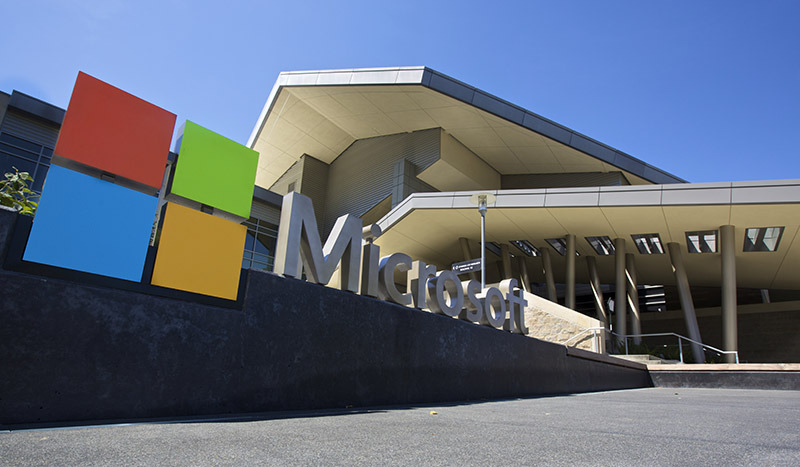Microsoft on Friday received the backing of Apple and other major technology, media and pharmaceutical companies in its legal fight to dislodge laws preventing it from informing customers of government requests for user data.
Apple was among a host of companies and corporate lobbies to file amici curiae, or friend of the court, briefs siding with Microsoft in its case to end gag orders targeting the release of government requests for data, reports Reuters.
Apple filed its brief with Mozilla, Lithium Technologies and Twilio. Others to file in favor of Microsoft's lawsuit include Amazon, Google, Snapchat, Salesforce, Twitter, the Electronic Frontier Foundation, Delta Air Lines the U.S. Chamber of Commerce, the National Association of Manufacturers, Eli Lilly and Co, BP America, the Washington Post, Fox News, the National Newspaper Association and more.
In April, Microsoft lodged a lawsuit against the U.S. Justice Department, saying a government statute that allows the government to search or seize customer data without their knowledge is unconstitutional. The DOJ filed a motion to dismiss the suit in July.
Law enforcement agencies are leveraging a contingency in the Electronic Communications Privacy Act of 1986 to prevent Microsoft from notifying customers when it hands over email correspondence or other private data. The company says the number of data requests — and secrecy orders — has increased as its customers store more sensitive data in the cloud.
These secrecy orders, Microsoft argues, violate the Fourth Amendment, which permits citizens and businesses the right to know of government searches or seizures of property. Microsoft is also having its First Amendment rights trampled on by not being afforded the opportunity to inform customers about the investigations.
For its part, the government's argument for secrecy hinges on a "reason to believe" that such disclosures would hinder ongoing investigations. Microsoft agrees to a certain extent, but takes issue with the frequency, and ease, in which gag orders are imposed. Time to expiration is also an issue, as some secrecy mandates are kept in effect indefinitely.
Like Microsoft, Apple frequently butts heads with the DOJ and other agencies over warrants for customer data, and their right to inform users of such requests. In 2014, Apple joined a cadre of technology firms, including Microsoft, in announcing efforts to more regularly notify their respective users of government data seizures. The alerts, however, are subject to gag orders, which is exactly what Microsoft is fighting in its lawsuit.
To increase transparency, Apple issues a biannual Report on Government Information Requests, with the latest release showing U.S. government data demands impacting nearly 5,200 accounts during the six-month period ending in April.
Most recently, Apple in February tussled with the DOJ and the FBI over extracting data from an iPhone associated with last year's San Bernardino terror attack. Apple declined to heed a court order calling for the company to thwart its own security systems, setting up a court battle that in turn sparked debate over how best to weigh public rights to privacy with national security.
At the time, Microsoft, along with Google, Twitter and other notable tech firms, filed motions supporting Apple in its legal struggle.
 Mikey Campbell
Mikey Campbell







-m.jpg)






 Thomas Sibilly
Thomas Sibilly
 Wesley Hilliard
Wesley Hilliard
 Marko Zivkovic
Marko Zivkovic

 Malcolm Owen
Malcolm Owen

 Amber Neely
Amber Neely










7 Comments
The main problem in the United States is apathy and unwillingness to fight back on the part of WE THE PEOPLE. How so? The US Government is little more than a creation of the people. When you vote party line Democrat or party line Republican in each election, you contribute to the status quo, which is no fight at all, despite the superficial tensions between the two parties. When elected, members of the House and Senate, whether Republican or Democrat, tend to act similarly on many key issues, especially those which they and the Justice Department contend are in the interests of "NATIONAL SECURITY." The problem is that when we have fraidy-cat voters, they believe everything is a threat and therefore they tend to do very little about protecting their individual liberty. Their apathy screams, "Go ahead and take my liberty, so long as you keep me safe!" So many people seem content to sell their very souls to Satan if it would give them an appearance of greater security, but in the end they find it a raw deal -- it is no guarantee of security at all. As such, every American should perpetually rise up to fight those in government who demand secrecy in the name of security. Apple, Microsoft and all the tech firms listed deserve the utmost praise for their courage and willingness to act.
Where is the support from these companies for Apple over EU's shenanigans of last week?